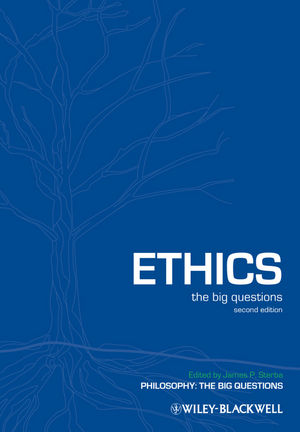|
Textbook
Ethics: The Big Questions, 2nd EditionISBN: 978-1-4051-9128-9
Paperback
602 pages
February 2009, ©2009, Wiley-Blackwell
 |
||||||
List of Sources.
Introduction.
Part I: The Nature of Morality: What Is Morality?
1. Morality as a Good in Itself: Plato.
2. The Emotive Theory of Morality: A. J. Ayer.
3. The New Subjectivism in Morality: Brand Blanshard.
4. How to Derive “Ought” from “Is”: John R. Searle.
5. On Not Deriving “Ought” from “Is”: Antony Flew.
6. Moral Beliefs: Philippa Foot.
7. Moral Disagreement Today and the Claims of Emotivism: Alasdair MacIntyre.
Part II: The Justification of Morality: Why Be Moral?
8. On Reason and the Emotions: David Hume.
9. The Justificatory Argument for Human Rights: Alan Gewirth.
10. The Sources of Normativity: Christine M. Korsgaard.
11. The Justification of Morality and the Behavior of Women: James P. Sterba.
12. The Rational Justification of Morality Revisited: Alan Gewirth.
13. Morality as a System of Hypothetical Imperatives: Philippa Foot.
Part III: Alternative Moral Perspectives: What Does Morality Require?
A. Utility.
14. Utilitarianism: John Stuart Mill.
15. Against Utilitarianism: Bernard Williams.
16. Traditional Morality and Utilitarianism: Kai Nielsen.
17. The Schizophrenia of Modern Ethical Theories: Michael Stocker.
18. Alienation, Consequentialism, and the Demands of Morality: PeterRailton.
B. Duty.
19. Duty and Categorical Rules: Immanuel Kant.
20. Kantian Ethics: Fred Feldman.
21. Kant on Dealing with Evil: Christine M. Korsgaard.
22. Liberty and Equality – A Question of Balance?: Jan Narveson.
23. Our Basic Human Right is a Right to Liberty and It Leads to Equality: James P. Sterba.
24. Welfare Liberalism: John Rawls.
25. Race and the Social Contract Tradition: Charles W. Mills.
C. Virtue.
26. The Virtuous Life: Aristotle.
27. Non-Relative Virtues: An Aristotelian Approach: Martha Nussbaum.
28. The Nature of Virtues: Alasdair MacIntyre.
29. Normative Virtue Ethics: Rosalind Hursthouse.
30. Virtue and Right: Robert N. Johnson.
31. Teleology, Aristotelian Virtue, and Right: Sean Drysdale Walsh.
32. Ancient Ethics and Modern Morality: Julia Annas.
Part IV: Challenges for Morality.
A. Feminism: How is Gender Relevant to Morality?
33. Equality for Men and Women: Musonius Rufus.
34. Moral Orientation and Moral Development: Carol Gilligan.
35. Caring Relations and Principles of Justice: Virginia Held.
36. Particular Justice and General Care: Claudia Card.
37. The Masculine Bias in Traditional Ethics and How to Correct It: James P. Sterba.
B. Environmentalism: Who is to Count in Morality?
38. Chimpanzee Justice: Frans De Waal.
39. All Animals Are Equal: Peter Singer.
40. The Ethics of Respect for Nature: Paul W. Taylor.
41. Kantians and Utilitarians and the Moral Status of Nonhuman Life: James P. Sterba.
42. The Power and Promise of Ecological Feminism: Karen J. Warren.
C. Multiculturalism: Morality From Whose Cultural Perspective?
43. A Modern Clash of Cultures: Ayaan Hirsi Ali.
44. Can Islam Liberate Women?: Madeleine Bunting.
45. Freedom and Democracy: George W. Bush.
46. Understanding the Bush Doctrine: Noam Chomsky.
Suggested Readings.
Introduction.
Part I: The Nature of Morality: What Is Morality?
1. Morality as a Good in Itself: Plato.
2. The Emotive Theory of Morality: A. J. Ayer.
3. The New Subjectivism in Morality: Brand Blanshard.
4. How to Derive “Ought” from “Is”: John R. Searle.
5. On Not Deriving “Ought” from “Is”: Antony Flew.
6. Moral Beliefs: Philippa Foot.
7. Moral Disagreement Today and the Claims of Emotivism: Alasdair MacIntyre.
Part II: The Justification of Morality: Why Be Moral?
8. On Reason and the Emotions: David Hume.
9. The Justificatory Argument for Human Rights: Alan Gewirth.
10. The Sources of Normativity: Christine M. Korsgaard.
11. The Justification of Morality and the Behavior of Women: James P. Sterba.
12. The Rational Justification of Morality Revisited: Alan Gewirth.
13. Morality as a System of Hypothetical Imperatives: Philippa Foot.
Part III: Alternative Moral Perspectives: What Does Morality Require?
A. Utility.
14. Utilitarianism: John Stuart Mill.
15. Against Utilitarianism: Bernard Williams.
16. Traditional Morality and Utilitarianism: Kai Nielsen.
17. The Schizophrenia of Modern Ethical Theories: Michael Stocker.
18. Alienation, Consequentialism, and the Demands of Morality: PeterRailton.
B. Duty.
19. Duty and Categorical Rules: Immanuel Kant.
20. Kantian Ethics: Fred Feldman.
21. Kant on Dealing with Evil: Christine M. Korsgaard.
22. Liberty and Equality – A Question of Balance?: Jan Narveson.
23. Our Basic Human Right is a Right to Liberty and It Leads to Equality: James P. Sterba.
24. Welfare Liberalism: John Rawls.
25. Race and the Social Contract Tradition: Charles W. Mills.
C. Virtue.
26. The Virtuous Life: Aristotle.
27. Non-Relative Virtues: An Aristotelian Approach: Martha Nussbaum.
28. The Nature of Virtues: Alasdair MacIntyre.
29. Normative Virtue Ethics: Rosalind Hursthouse.
30. Virtue and Right: Robert N. Johnson.
31. Teleology, Aristotelian Virtue, and Right: Sean Drysdale Walsh.
32. Ancient Ethics and Modern Morality: Julia Annas.
Part IV: Challenges for Morality.
A. Feminism: How is Gender Relevant to Morality?
33. Equality for Men and Women: Musonius Rufus.
34. Moral Orientation and Moral Development: Carol Gilligan.
35. Caring Relations and Principles of Justice: Virginia Held.
36. Particular Justice and General Care: Claudia Card.
37. The Masculine Bias in Traditional Ethics and How to Correct It: James P. Sterba.
B. Environmentalism: Who is to Count in Morality?
38. Chimpanzee Justice: Frans De Waal.
39. All Animals Are Equal: Peter Singer.
40. The Ethics of Respect for Nature: Paul W. Taylor.
41. Kantians and Utilitarians and the Moral Status of Nonhuman Life: James P. Sterba.
42. The Power and Promise of Ecological Feminism: Karen J. Warren.
C. Multiculturalism: Morality From Whose Cultural Perspective?
43. A Modern Clash of Cultures: Ayaan Hirsi Ali.
44. Can Islam Liberate Women?: Madeleine Bunting.
45. Freedom and Democracy: George W. Bush.
46. Understanding the Bush Doctrine: Noam Chomsky.
Suggested Readings.



